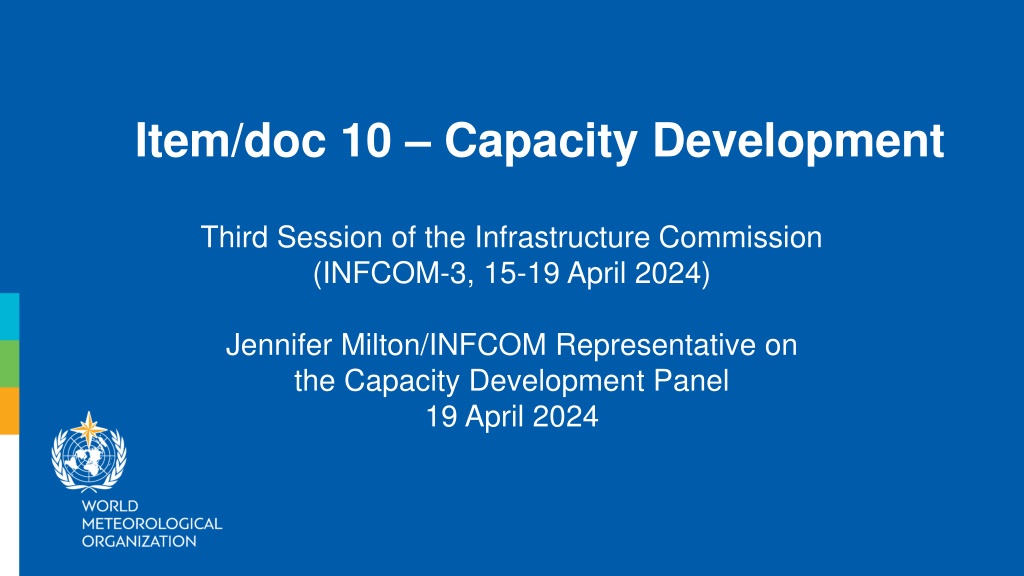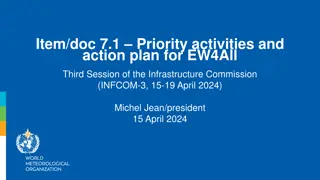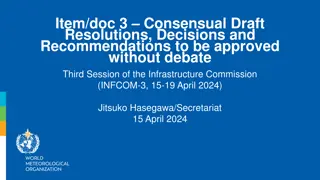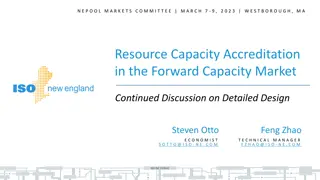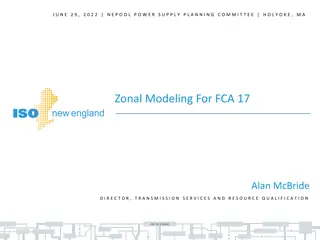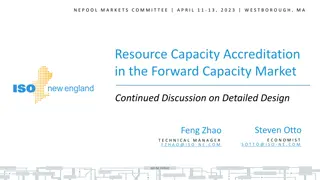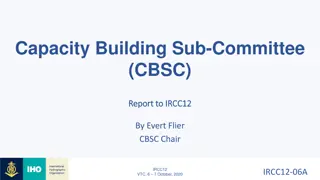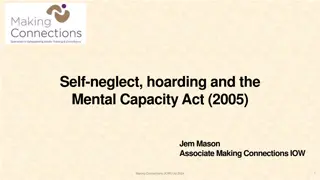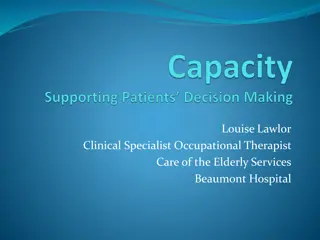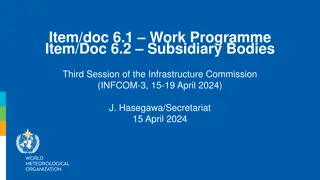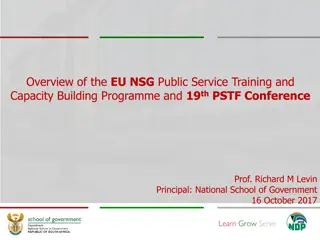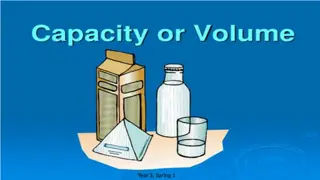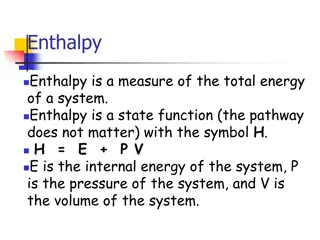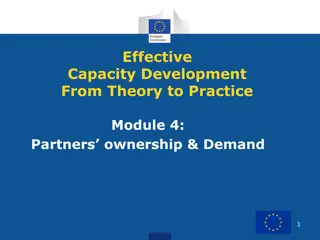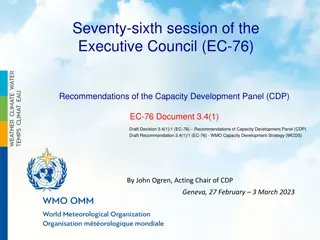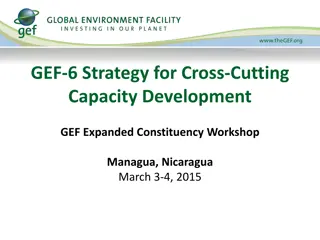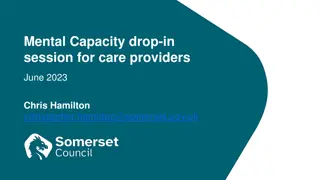INFCOM Capacity Development Initiatives Overview
INFCOM's capacity development initiatives focus on enhancing Earth system observations, closing capacity gaps on weather services, and supporting new opportunities in competencies and capabilities. Collaboration and coordination mechanisms have been established to facilitate sharing of information and training plans. Access to capacity development materials is provided through the INFCOM Capacity Development Materials Dashboard.
Download Presentation

Please find below an Image/Link to download the presentation.
The content on the website is provided AS IS for your information and personal use only. It may not be sold, licensed, or shared on other websites without obtaining consent from the author. Download presentation by click this link. If you encounter any issues during the download, it is possible that the publisher has removed the file from their server.
E N D
Presentation Transcript
Item/doc 10 Capacity Development Third Session of the Infrastructure Commission (INFCOM-3, 15-19 April 2024) Jennifer Milton/INFCOM Representative on the Capacity Development Panel 19 April 2024
Capacity Development - INFCOM Contributing to WMO Strategic Plan Goal 2: Enhance Earth system observations and predictions WMO Strategic Plan Goal 4:Close the capacity gap on weather, climate, hydrological and related environmental services Expanded World Weather Watch- Earth system approach and the means for gathering, sharing, processing information obtained from the system Support to opportunities created by SOFF Requirements from new initiatives such as EW4All and G3W Address the evolving requirements in competencies and capabilities
Capacity Development - INFCOM INFCOM-2 endorsed Decision 20 (8/1) which called upon the creation of a mechanism for coordination on capacity development activities within INFCOM and items related to competency frameworks and the planning and implementation of training activities in collaboration with INFCOM regional centers and others of which RTCs and the EC CDP. Mechanism for coordination on capacity development: Representatives of subsidiary bodies of INFCOM, Technical coordinators and other focal points, INFCOM rep on the CDP and secretariat. Collaboration, sharing of information and coordination.
Capacity Development - INFCOM Coordination Mechanism established in 2023, enabling The compilation and sharing of training plans from SCs, AGs and SOFF providing opportunities for coordination and outreach. The sharing of practices, challenges and potential opportunities for coordination of capacity development related activities Mapping of existing guidance/training and gaps to competencies in Measurements, Instrumentation and Traceability Training framework for GBON and WIGOS tools Sharing of reference material to support the translation of material The awareness and use of the Capacity Development Framework (https://community.wmo.int/en/governance/executive-council/executive-council/capacity- development-panel),
Capacity Development - INFCOM Capacity Development Materials Dashboard Facilitates access to INFCOM capacity development and training material for Members Available on INFCOM Community pages https://community.wmo.int/en/capacity- development-materials-dashboard
Draft Decision 10/1 Capacity Development Coordination Mechanism within INFCOM Includes corrections to text by Russian Federation (1) To endorse the established mechanism for coordination on capacity development activities among INFCOM groups, with particular focus on activities that contribute to the Early Warnings for All initiative and the Global Greenhouse Gas Watch [Co-chairs of SG-GHG]; (2) To utilize this mechanism to coordinate capacity development activities led by INFCOM, including, but not limited to, the items below, using the WMO Capacity Development Framework adopted as Resolution 36 (Cg-19) - WMO Capacity Development Strategy (WCDS), as an overall guidance; (3) To endorse the establishment of the Capacity Development Materials Dashboard to improve the access existing capacity development and training materials, and further develop and maintain it;
Draft Decision 10/1 Capacity Development Competency Frameworks (4) To review, in collaboration with the regional offices, the existing Competency Frameworks (Part V of the Technical Regulations (WMO-No. 49), Volume I General Meteorological Standards and Recommended Practices and the Compendium of WMO Competency Frameworks (WMO-No. 1209)), and, in coordination with the Capacity Development Panel (CDP), assess the needs and requirements, and draft a plan for updating the existing and developing new Competency Frameworks, as necessary; (a) Noting the ongoing effort of the Standing Committee on Measurements, Instrumentation and Traceability (SC-MINT) to map existing guidance and training materials to required competencies and to identify potential gaps, to encourage other groups to leverage the experience. (INFCOM-3/INF. 10 Section A)
Draft Decision 10/1 Capacity Development Plan and implementation of training activities (5) To endorse, with appreciation, the training activities organized during the intersessional period since October 2022 (as presented in INFCOM-3/INF. 10 Section B), and the plan for training activities for the next intersessional period (as presented in INFCOM-3/INF. 10 Section C), and request the Management Group, in coordination with CDP and regional working groups, supported by the regional offices, to support implementation of this plan; (6) To note the support to the implementation of the Global Basic Observing Network (GBON) through the Systematic Observations Financing Facility (SOFF) reported in INFCOM-3/INF. 8.1(4), and to encourage the Standing Committee on Earth Observing Systems and Monitoring Networks (SC-ON), SC-MINT, and the Standing Committee on Information Management and Technology (SC-IMT) to support the capacity development opportunities created by SOFF through their regional centre activities, training material and events, in the context of WMO s role as Technical Authority to SOFF; (7) To promote the Earth system approach in any capacity development activities by involving Earth system domains/disciplines, especially ocean, hydrology, cryosphere, atmospheric composition, and space weather, as well as by enhancing cooperation among regional centres of WMO with other bodies of Earth system domains/disciplines (e.g. Global Ocean Observing System (GOOS) Regional Alliances);
Draft Decision 10/1 Capacity Development Plan and implementation of training activities (8) To encourage INFCOM-related centres (e.g. Regional WMO Integrated Global Observing System (WIGOS) Centres (RWCs), Regional Instrument Centres (RICs), Regional Marine Instrument Centres (RMICs), World and Regional Radiation Centres (WRC and RRC) and Measurement Lead Centres (MLCs), WMO Information System (WIS) Centres, WMO Integrated Processing and Prediction (WIPPS) Centres) to collaborate with WMO Regional Training Centres (RTCs), supported by the regional offices, on the development and conduction of the training activities towards the achievement of the WMO long-term goals and the strategic objectives; (a) Noting the ongoing effort of SC-ON to develop a training framework for WIGOS, mainly in the area of GBON and WIGOS tools at this moment (as presented in INFCOM-3/INF. 10 Section D) as a reference document for any capacity development activities related to this area, and to encourage other groups to leverage the experience; (b) To identify and mobilize existing education and training opportunities and resources and seek the possibility to expand the designated centres network where appropriate;
Draft Decision 10/1 Capacity Development Plan and implementation of training activities (9) To explore innovative ways, including the use of machine translation, to make training resources available in all UN official languages, as well as to promote the use of existing instructions for translation, like those produced by the COMET Translation Resource Center, to facilitate the preparation of training materials in more than one language; (10) To coordinate with the WMO Global Campus and CONECT initiatives, through CDP for the development and mobilization of education and training opportunities and resources, develop partnerships and leverage supporting technologies for collaborative capacity development projects, and promote sharing resources across institutions, by using, as relevant, interoperable technological means; (Organization of Technical Conference (TECO), with Private Public Engagement) (11) Noting the plan for TECO in 2024 (from 23 to 26 September 2024, in Vienna, Austria), to continue regular, biennial organization of the WMO Technical Conferences on the Meteorological and Environmental Instruments and Methods of Observation (TECOs) as an excellent opportunity for capacity development, including a mutually beneficial partnership with the private sector.
Thank you. wmo.int
